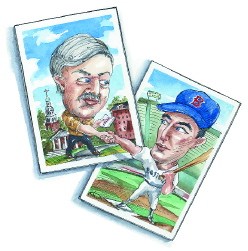The favorite baseball player of the late Harvard professor Stephen Jay Gould (1941-2002)as readers of a new collection of his essays on the sport, Triumph and Tragedy in Mudville (W.W. Norton, $24.95) will soon discover if they don't already knowwas Joe DiMaggio. Although New Yorker Gould became a season-ticket holder at Fenway Park and "came to appreciate the complexity of being a Red Sox fan," writes David Halberstam '55 in his foreword to the book, the paleontologist continued to idolize DiMaggio and failed to connect with a local legend, to Halberstam's regret.
| |
 |
| Illustration by Mark Steele |
I'd have loved to have been a fly on the wall for that one. After all, Williams's own philosophy (though he was technically a political conservative and Gould a liberal) paralleled Gould's with some surprising similarities, and Gould would have loved one of Williams's elemental truths of both baseball and life: "God gets you to the plate, but from then on, you're on your own." That is, natural talent has a lot to do with the earlier rounds of selection in any enterprise, but what you put into it on your own, how hard you work and how much passion you bring to it, how much you study to improve yourself matters equallyit is our mark as individuals, our passions, our visions, our commitment on occasion to something larger than ourselves, which sets us apart.
| |
Text copyright © 2003 by Turbo, Inc. Reprinted with permission of the publisher, W.W. Norton & Company, Inc.





